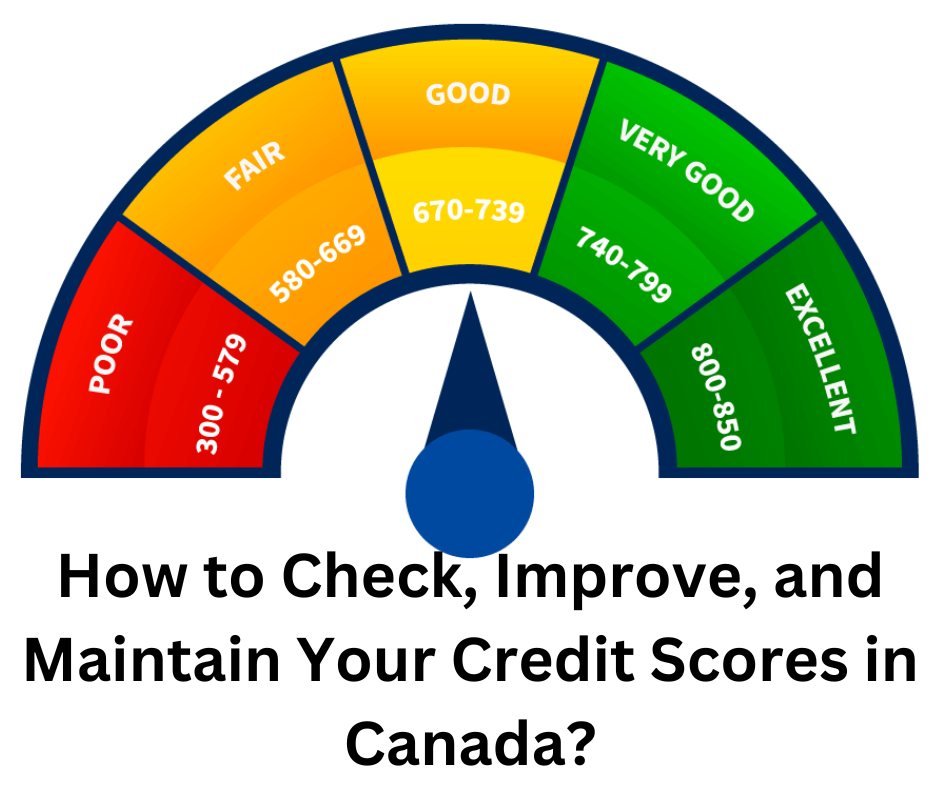
Your credit score is more than just a number—it’s your financial reputation. Whether you’re applying for a mortgage, car loan, or even a rental apartment in Canada, a strong credit score opens doors. But what exactly is a credit score, how do you check it, and what can you do to boost it? Let’s break it down.
What is a Credit Score?
Your credit score is a three-digit number (ranging from 300 to 900) that reflects your creditworthiness. It’s calculated based on:
- Payment history (35%)
- Credit utilization (30%)
- Credit history length (15%)
- Credit mix (10%)
- New credit inquiries (10%)
In Canada, Equifax and TransUnion are the two major credit bureaus that track and report scores.
What’s a Good Credit Score in Canada?
| Credit Score Range | Rating | What It Means |
|---|---|---|
| 800–900 | Excellent | Lowest interest rates, premium credit cards, and easy loan approvals. |
| 720–799 | Very Good | Competitive rates and high approval chances. |
| 650–719 | Good | Qualify for most loans but may pay slightly higher interest. |
| 600–649 | Fair | Limited credit options; may require co-signers. |
| 300–599 | Poor | Loan denials or extremely high interest rates. |
Did You Know? The average credit score in Canada is 672 (Equifax, 2023).
How to Check Your Credit Score for Free
You don’t need to pay to check your score. Here’s how:
- Through Your Bank:
- RBC: Use RBC’s online banking app or website (free for clients).
- TD Canada: Access your score via the TD MySpend app.
- Credit Bureaus:
- Equifax: Sign up for a free account at Equifax.ca.
- TransUnion: Use their CreditView Dashboard.
- Third-Party Apps:
- Borrowell and Credit Karma offer free weekly updates.
⚠️ Note: Checking your own score is a soft inquiry and won’t affect your credit.
How to Increase Your Credit Score: 7 Proven Tips
- Pay Bills on Time, Every Time
Late payments can tank your score by 100+ points. Set up automatic payments for loans and credit cards. - Keep Credit Utilization Below 30%
Example: If your credit limit is $10,000, aim to spend ≤$3,000 monthly. - Avoid Closing Old Accounts
Longer credit history = Better score. Keep that 10-year-old credit card active. - Limit Hard Inquiries
Each loan or credit card application triggers a hard inquiry, which can drop your score by 5–10 points. - Diversify Your Credit Mix
Having a mix of credit (e.g., credit card, line of credit, mortgage) shows you can manage different types. - Dispute Errors on Your Report
1 in 4 Canadians has errors on their credit report. Check annually and dispute inaccuracies via Equifax or TransUnion. - Use a Secured Credit Card
If rebuilding credit, a secured card (backed by a cash deposit) can help boost your score responsibly.
RBC and TD Credit Score Tools: A Closer Look
RBC Credit Score
- How to Access: Log into RBC Online Banking → Navigate to “My Credit Score.”
- Features: Free monthly updates, personalized tips, and alerts for significant changes.
TD Credit Score
- How to Access: Use the TD MySpend app → Tap “Credit Score.”
- Features: Tracks spending habits and offers tailored advice to improve your score.
Equifax vs. TransUnion: What’s the Difference?
| Factor | Equifax | TransUnion |
|---|---|---|
| Score Range | 300–900 | 300–900 |
| Free Report Access | Yes (via Equifax.ca) | Yes (via CreditView Dashboard) |
| Key Strength | Detailed payment history | Robust fraud alerts |
💡 Tip: Lenders may check one or both bureaus. Monitor both for accuracy.
What’s a Hard Inquiry vs. Soft Inquiry?
- Hard Inquiry: Occurs when a lender checks your credit for a loan/credit card application. Lowers score temporarily.
- Soft Inquiry: When you check your own score or employers/landlords verify it. No impact on score.
FAQs: Credit Scores in Canada
1. How often should I check my credit score?
Monthly checks are safe (soft inquiries). Use free tools like Borrowell or your bank’s portal.
2. Can I get a free credit report?
Yes! By law, you’re entitled to one free report annually from Equifax and TransUnion.
3. How long do negative marks stay on my report?
- Late payments: 6–7 years
- Bankruptcies: 6–7 years (depending on type)
4. Will closing a credit card hurt my score?
Yes—it shortens credit history and increases utilization. Keep old cards open.
5. How fast can I improve a poor score?
With consistent effort (on-time payments, low utilization), you can see improvements in 6–12 months.
The Bottom Line
A strong credit score isn’t built overnight, but with discipline, you can hit 800+. Whether you’re an RBC customer using their free tools or a TD client tracking spending habits, staying informed is key. Remember: Your credit score is a marathon, not a sprint.
READ ALSO Why Do You Want to Join Banking Industry? Takapoysanews
Pro Tip: Set calendar reminders to check your score quarterly and adjust habits as needed.
Sources: Equifax Canada, TransUnion Canada, Government of Canada.